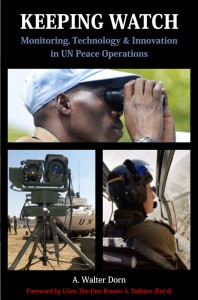
Amazon Pre-Order Page (Moves in August not December, Amazon Page Has Not Been Properly Set Up By Publisher).
Knowledge is power. In the hands of the UN peacekeepers it can be a power for peace. Lacking knowledge, peacekeepers often find themselves powerless in the field, unable to protect themselves and others. The United Nations owes it to both its peacekeepers and the “peacekept” to utilize modern tools to make its monitoring effective for conflict prevention and resolution.
Keeping Watch explains how modern technologies can increase the range, efficiency and accuracy of UN observation. Satellites, aircraft and ground sensors enable surveillance of large areas over long periods. They can provide imagery of hot spots for use as evidence in human rights investigations. Sensors can be the extended “eyes” of UN patrols, humanitarian convoys and robust UN operations. Fortunately, commercial technologies have been increasing exponentially in capability while decreasing rapidly in cost. The United Nations, however, continues to use technologies and techniques from decades past.
This book identifies the benefits and pitfalls of specific technologies. The few cases of technologies effectively harnessed in the field are showcased, and creative recommendations are offered to overcome the institutional inertia and widespread misunderstandings about how technology can complement human initiative in the quest for peace in war-torn lands.
A. Walter Dorn teaches military officers and civilians at the Canadian Forces College (CFC) and at the Royal Military College of Canada. He is a professor of defence studies and Chair of the Department of Security and International Affairs at CFC. He has both studied and served on UN peace operations, and worked as a consultant to the UN's Department of Peacekeeping Operations.



